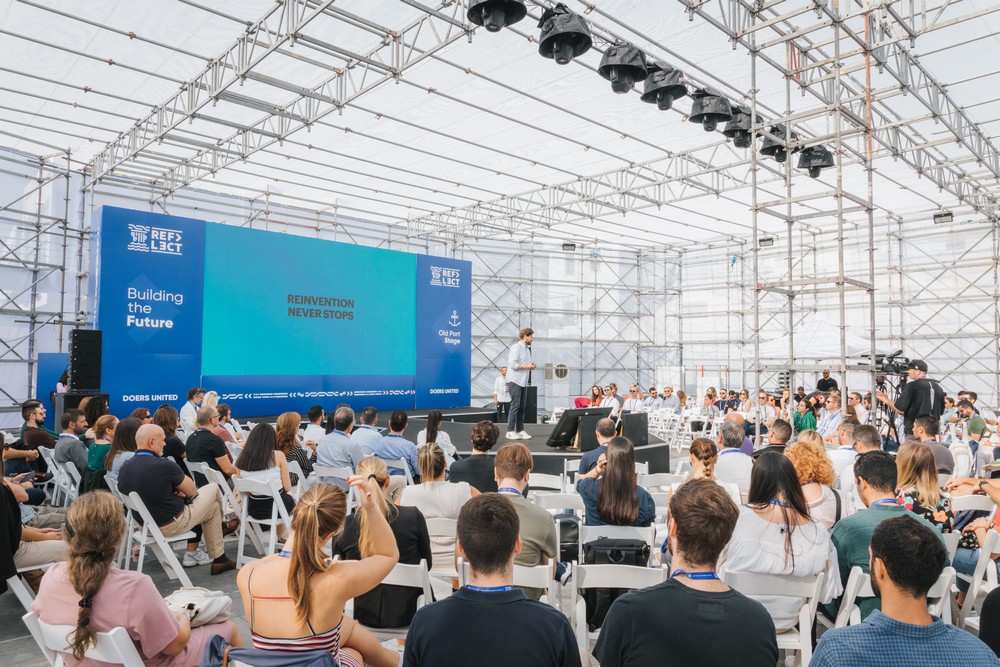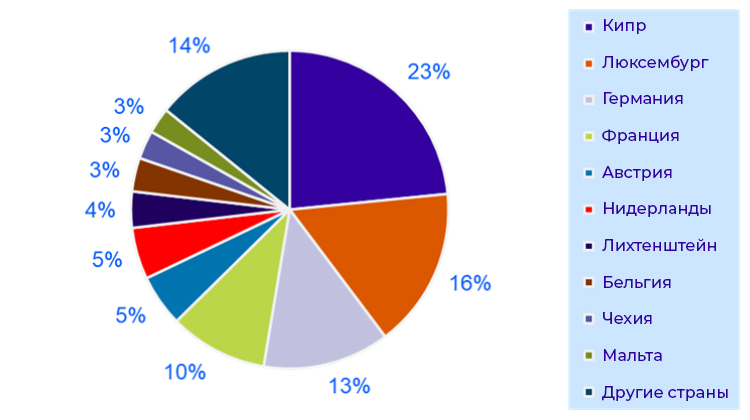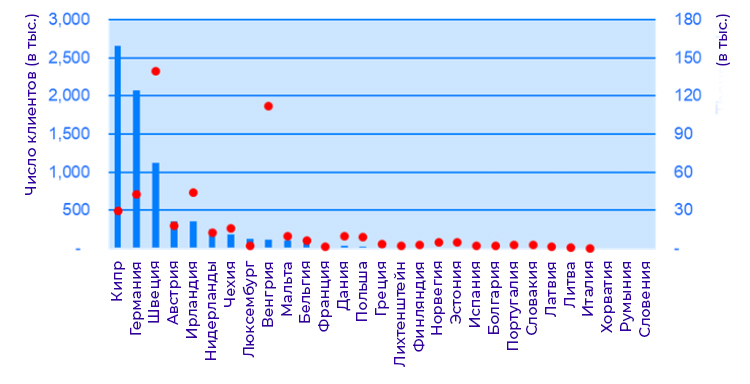7 декабря рейтинговое агентство Fitch повысило кредитный рейтинг Кипра с ВВВ+ до А-. Это уже второе агентство, которое присвоило стране рейтинг А за последние три недели.
Агентство заявило, что главными факторами стали быстрое сокращение государственного долга, значительный профицит бюджета и ограниченные финансовые риски, сильный потенциал роста кипрской экономики, позитивные среднесрочные перспективы и улучшение состояния банковского сектора.
Эксперты Fitch заявили, что на Кипре произошло одно из самых значительных сокращений государственного долга по отношению к ВВП среди всех стран, которые они оценивали в этом году. Текущие прогнозы предполагают, что сокращение госдолга продолжится до 60% ВВП в следующем году и 55,1% в 2026 году. Это значительно ниже текущего среднего показателя по еврозоне – 89%.
Профицит бюджета достигнет 3,9% ВВП в этом году, а в течение следующих двух лет этот показатель составит в среднем 2,9%.
Президент Никос Христодулидис приветствовал новость о повышении кредитного рейтинга страны, назвав это «признанием позитивного курса страны» и «вотумом доверия нашей ответственной политике».
Министр финансов Макис Керавнос отметил, что повышение рейтинга «наглядно демонстрирует доверие международных рейтинговых агентств к экономической политике, проводимой правительством». «Оно создает необходимый климат доверия и стабильности для привлечения иностранных инвестиций в нашу экономику, повышения конкурентоспособности и постоянного создания новых рабочих мест», ― сказал глава Минфина.
В июне этого года агентство Fitch повысило кредитный рейтинг Кипра с BBB до BBB+, заявив тогда, что этот шаг «отражает снижение уязвимости к финансовым потрясениям, устойчивость к внешним потрясениям и благоприятные среднесрочные тенденции».
Три недели назад рейтинговое агентство Moody's присвоило Кипру рейтинг А3, впервые с 2011 года.
Текст подготовлен по материалам Cyprus Mail
Читайте также:
Центробанк Кипра: экономика страны устойчива к вызовам
Кипр получил кредитный рейтинг A3 от Moody’s
47% предприятий на Кипре сталкивались с кибератаками в последние 12 месяцев. Это чуть меньше, чем в 2023 году, когда таких компаний было 49%. В среднем кибератаки происходили каждые 10 дней.
Такие результаты демонстрирует исследование Управления комиссара по коммуникациям и цифровой безопасности. Оно проходило с сентября по октябрь 2024 года с выборкой из 450 компаний в секторе промышленности, торговли и услуг.
Почти половина предприятий (47% в 2024 году, 49% в 2023 году и 46% в 2022 году) подвергались кибератакам в течение последних 12 месяцев.
Из компаний, подвергшихся кибернападениям, более половины (56%) понесли финансовые убытки, составившие в среднем 12 000 евро. Этот процент увеличился по сравнению с предыдущими двумя годами (48% в 2022 году и 47% в 2023 году). Зато сама сумма издержек оказалась меньше на 15 000 евро по сравнению с прошлым годом и на 10 000 меньше, чем в 2022 году.
Фишинг – на первом месте
Наиболее частой формой кибератаки на бизнес был фишинг. О нем сообщили 40% респондентов. Это на три процентных пункта ниже по сравнению с прошлым годом и на шесть процентных пунктов выше по сравнению с 2022 годом. Самая недавняя по времени кибератака также была фишинговой, о чем заявили 71% респондентов.
Компании, работающие в сфере услуг, внедряют или обновляют технические меры кибербезопасности два раза в неделю, в отличие от компаний промышленного и торгового сектора, которые обновляют эти меры каждые пять дней. При этом каждая четвертая компания не обновляла и не пересматривала свою политику кибербезопасности больше года. Бизнес не знает о семинарах по кибербезопасности, только 13% опрошенных фирм приняли в них участие.
Из числа предприятий, которые не подверглись нападению, 37% считали, что этого не произошло, потому что их компания не представляет «целевой аудитории» для мошенников. Тем не менее, любая компания может стать жертвой кибератаки.
Текст подготовлен по материалам Politis
Читайте также:
Новые риски потребуют изменений банковской политики
По данным Евростата, самый высокий европейский МРОТ – в Люксембурге: 2508 евро в месяц. Самый низкий – в Болгарии: 399 евро в месяц.
Минимальный размер оплаты труда на Кипре оказался одним из самых низких среди стран ЕС: 940 евро в месяц. При этом средний показатель по 22 государствам ЕС, где законодательно установлен нижний порог, составляет 1132 евро в месяц.
Евростат публикует данные о минимальной заработной плате в стране дважды в год, в январе и июле. Все страны ЕС в этом исследовании обычно делятся на три различные группы:
– Группа 1 с МРОТ выше 1500 евро в месяц: Люксембург, Германия, Нидерланды, Бельгия, Ирландия и Франция. Национальная минимальная заработная плата во Франции составляет 1747 евро.
– Группа 2 с МРОТ выше 1000 евро, но ниже 1500 евро в месяц, в которую входят Испания (1260 евро) и Словения (1203 евро).
– Группа 3 с МРОТ ниже 1000 евро в месяц: Кипр, Греция, Португалия, Литва, Мальта, Польша, Чехия, Эстония, Словакия, Хорватия, Венгрия, Латвия, Румыния и Болгария.
Все страны-кандидаты и потенциальные кандидаты в ЕС с национальной минимальной заработной платой относятся к группе 3. Диапазон МРОТ там составляет от 375 евро в Албании до 532 евро в Черногории.
Среднегодовые темпы роста МРОТ в период с июля 2013 по июль 2023 года были самыми высокими в Румынии (+12,9%), за ней следуют Литва (+11,2%), Болгария (+9,7%) и Чехия (+9%). Самые низкие среднегодовые темпы роста среди государств ЕС зафиксированы на Мальте (+1,7%) и во Франции (+2%).
Напомним, МРОТ на Кипре был введен 1 января 2023 года. Кипр стал 22-м государством Евросоюза, закрепившим минимальную оплату труда.
Читайте также:
Почасовая зарплата на Кипре и в ЕС
Кто сколько зарабатывает на Кипре?
Reflect Festival, the flagship technology event of Cyprus, is set to take over Limassol seaside this September again, with its most impactful program yet.
Limassol, Cyprus - Reflect Festival, one of the fastest-growing tech events in the region spanning Southern Europe, the Middle East and North Africa, has unveiled ambitious plans for its 6th edition. The organizers are preparing five stages and an expo with over 200 booths located in the heart of Limassol, attracting a community of more than 8000 people. "It will be a truly immersive city experience - the city center, as well as the seaside promenade, will be full of festival activities during two Reflect days. Essentially, we're transforming the city - including its squares, restaurants, and parks - into what we call a playground of doers," says Stylianos Lambrou, co-founder of Reflect.
The event has quickly evolved into a major technology and entrepreneurship gathering, solidifying its position as the ultimate one-stop shop for building connections across three regions. The program is designed to maximize opportunities and foster synergies among the audience, consisting primarily of founders, startups, tech powerhouses, decision-makers, and investors.
"No fluff" learning and a startup competition
Reflect's stages will welcome over 100 speakers from around the world. This year, the topics at the Old Port Stage will cater to founders and startups, with a dedicated section for investors. "We're introducing a brand new program feature on this stage: ReflectX, a startup competition that shines a spotlight on some of the region's most promising young businesses," says Dusan Duffek, the festival's co-founder. The winner of ReflectX will receive a €15,000 cash prize and a Cyprus Startup Destination Package to explore Cyprus as a location to establish an office. Microsoft will offer a spot in the global startup program, Microsoft for Startups FoundersHub, which means up to $150,000 in free Azure credits and guidance from business experts, mentors, and technical advisors from Microsoft’s curated network. All prizes are listed on ReflectX's website, with more continuously being added.
Tech enthusiasts will enjoy two days filled with fintech, blockchain, gaming, Web3 and the future of the internet at the Carob Mill Stage. Meanwhile, the Molos and Pier stages will cover a wide array of trending topics, including the latest in tech, the future of work, health, well-being, the future of society, and sustainability. In addition to talks and panels, attendees can engage with speakers through hands-on workshops and roundtable discussions.
The first round of announced speakers includes Loulou Khazen Baz (Managing Partner at Spade Ventures), Lubo Smid (CEO & Founder at STRV), Leanne Elliott-Young (CEO & Co-Founder at Institute of Digital Fashion), Mergim Cahani (Founder and CEO of Gjirafa), and Alexandra Balkova (Partner and Head of Portfolio at Startup Wise Guys), with more names being continuously added.
Large-scale expo and enhanced networking
Reflect's expo will feature over 200 companies, with both Cypriot and international startups, scale-ups and tech players showcasing their innovative products and services. Additionally, event partners are preparing exciting activities within their booths, further enriching the exhibition area. "We're thrilled to see how many businesses recognize the value of coming here to meet their peers and potential investors and customers. This year's expo will span throughout the city, bringing tech and innovation to the forefront of public attention," says Lambrou.
To enhance networking opportunities, the organizers are introducing several lounges for investors, startups, C-level guests, and VIPs. An AI-powered networking app will help attendees connect with the right individuals. Parties, networking lunches, and meetups will also encourage serendipitous encounters. "Networking is at the heart of what we do, and we'll ensure that our doers have plenty of opportunities to reconnect with old friends and make new ones. Reflect is all about open-minded, positive people in a family atmosphere, and it will always stay that way, no matter how much we grow. Through these genuine connections, we strive to create measurable impact for the attendees, as well as the wider business ecosystem,” concludes Alexander Jahn, Reflect's Managing Partner.
Those who want to attend can currently purchase Early Bird tickets, which are already on sale on Reflect's website. For partnering or exhibiting with Reflect Festival, please reach out to Этот адрес электронной почты защищён от спам-ботов. У вас должен быть включен JavaScript для просмотра.
Reflect Festival is the largest technology and startup festival in Cyprus. It brings together a diverse community of tech enthusiasts, founders, startups, decision-makers, and investors for an immersive city experience filled with insightful talks, panels, workshops, an expo, startup competition and networking opportunities. Reflect Festival aims to bridge the gap between Europe and MENA and create meaningful business value by fostering connections, innovation, and collaboration in the tech industry. Its 6th edition will take place on September 20-21, 2023, in Limassol.





Material for the press-release provided by the Reflect Festival Organizing Committee
Налогоплательщики теперь могут оплатить любую задолженность по налогам онлайн, после подачи своих деклараций в электронном виде. Об этом заявил глава Налогового департамента Сотирис Маркидис. 11 500 физических лиц уже подали декларацию о своих доходах за 2022 год.
По состоянию на 21 июля около 16 000 человек получили на портале Taxisnet доступ к декларации о доходах физических лиц без счетов за прошлый год. Из них 11 500 подали окончательные версии своих деклараций, остальные 4500 все еще обрабатывают их.
В электронную форму декларации за 2022 год была добавлена новая гиперссылка, которая направляет налогоплательщика на страницу немедленной выплаты любой задолженности. Рядом с суммой причитающегося налога есть кнопка для перехода либо в интернет-банкинг, где оплата производится со счета, выбранного налогоплательщиком, либо на портал JCC Smart, где платеж может быть произведен с помощью кредитной или дебетовой карты.
По словам Маркидиса, налогоплательщики, которые ранее зарегистрировались в онлайн-системе подачи налоговых деклараций Taxisnet, смогут использовать те же пароли для нового налогового портала. Он также извинился перед налогоплательщиками за задержку с размещением декларации о доходах физических лиц в системе Taxisnet, объяснив это принятием 30 июня нового закона. Напомним, из-за этого крайний срок подачи деклараций был продлен с 31 июля до 2 октября этого года.
«Процедура заполнения декларации за 2022 год сохраняет всю автоматизацию, которая была внедрена в последние годы, для более быстрой и легкой подачи», — заключил Маркидис.
Согласно постановлению Кабинета министров, наемные работники, пенсионеры и самозанятые лица, чей совокупный доход за 2022 налоговый год не превышает 19 500 евро, не обязаны подавать декларацию о личных доходах. Подробную инструкцию по заполнению декларации можно найти на официальном налоговом портале.
Новое налоговое соглашение с Оманом
Тем временем, правительство одобрило соглашение об избежании двойного налогообложения и предотвращении уклонения от уплаты налогов с султанатом Оман. Соглашение основано на типовой конвенции ОЭСР об избежании двойного налогообложения и типовой конвенции ООН. Министр финансов Макис Керавнос заявил, что соглашение считается важным для Республики Кипр, поскольку оно будет способствовать дальнейшему развитию экономических и торговых отношений между Кипром и султанатом Оман.
Читайте также:
Поправки к закону о подоходном налоге вступили в силу
Налоговые льготы для бизнеса: какие и как получить
21 July 2023 – Larnaca, Cyprus. Cyprus Airways, the islands’ flag carrier, welcomed its first two Airbus A220 during an official inauguration ceremony held at the Private and Presidential Terminal, Skylink Services Ltd, and headed by the President of the Republic of Cyprus, Mr Nikos Christodoulides.
Present for this inauguration were also the Minister of Tourism Mr, Kostas Koumis, Officials representing the ministry of Finance and Transportation, Civil Aviation and Hermes Airports officials, members of the Media and Cyprus Airways’ Shareholder, Board of Directors, and Management.
During a short speech Paul Sies, CEO of Cyprus Airways, said, “Today marks a significant development in the history of Cyprus Airways. We are delighted to welcome our first two Airbus A220 aircraft to our fleet.
“From an A320 operator, the transition to the advanced A220-300 signifies a remarkable milestone and a new era for us. It marks another important step in the transformative journey of Cyprus Airways to offer an unparalleled on-board travel experience, enhance its operational efficiency and substantially decrease its environmental footprint. This aircraft is celebrated for its exceptional features and capabilities and perfectly aligns with our vision to strike the best balance between passenger comfort and operational efficiency,” added Mr Sies.
With its largest-in-class cabin, the 150-seater A220-300 offers passengers unmatched comfort. The aircraft boasts of the widest economy seats of any single aisle aircraft, large and panoramic windows, largest overhead stowage, quietest cabin in its class and usb charging facilities amongst others.
The aircraft’s significant environmental advantages include its unbeatable fuel efficiency with a 25% reduction in CO2 emissions per seat, a 50% reduction in NOx emissions than industry standards and a 50% smaller noise footprint area than previous generation aircraft.
“Cyprus Airways is committed to sustainable travel and our philosophy is exemplified by the A220-300 aircraft. This aircraft will play a pivotal role in realising a greener, more sustainable travel experience and superior comfort for our customer”, concluded Mr Sies.
The two aircraft are expected to enter service with Cyprus Airways’ fleet in the coming days and will operate to the airline’s most popular destinations.
The aircraft flew to Cyprus last week from Mirabel, Quebec, Canada, home of the Airbus A220 program.
About Cyprus Airways
Cyprus Airways, Cyprus’s flag-carrier, resumed operations in 2016. The airline operates two Airbus A320 aircraft fleet which are currently operating on an nineteen-scheduled destination network. Winter destinations include Athens, Beirut, Tel Aviv, Yerevan, Paris, Rome, Dubai, Milan-Bergamo, Prague and Zurich. Additionally, summer destinations include Basel, Santorini, Skiathos, Rhodes, Heraklion and Cairo.
The airline upgraded its fleet with new more environmentally friendly aircraft that will offer up to 40% less CO2 emissions, a lower noise footprint, and a totally new customer comfort standard.
Learn more at: www.cyprusairways.com
Facebook: facebook.com/cyprusairways
Instagram: instagram.com/cyprusairways
LinkedIn: linkedin.com/company/cyprusairways
Material for the press-release provided by Cyprus Airways
Вопрос авиасообщения с другими странами очень важен для кипрского туризма и экономики в целом, напомнил 21 июля президент Никос Христодулидис. Он присутствовал на презентации двух новых самолетов Airbus A220-300, приобретенных авиакомпанией Cyprus Airways. Мероприятие прошло в старом аэропорту Ларнаки. В нем также приняли участие глава Подминистерства туризма Костас Кумис и другие государственные чиновники. Епископ Неапольский Порфириос совершил освящение воздушных судов.
Президент осмотрел внутри один из новых самолетов. Глава государства рассказал, что правительство намерено обсудить с авиакомпанией возможность открыть авиасообщение с городами, куда самолеты с Кипра еще никогда не летали. «Мы договорились о встрече, на которой обсудим, как синхронизировать наши действия, чтобы заполнить любые имеющиеся пробелы», — сказал Христодулидис. На вопрос, полетит ли он сам на новом самолете Airbus, президент Христодулидис ответил положительно, отметив, что несколько дней назад летал коммерческим рейсом в Брюссель и обратно.
Новые самолеты прибыли на Кипр из Канады. В каждом 122 посадочных места в эконом-классе и 12 мест в бизнес-классе. Сиденья и багажные отделения больше, чем у Airbus A320 и у всех остальных узкофюзеляжных самолетов. Иллюминаторы шире, а салон оборудован разъемами USB.
Самолет выбрасывает на 25% меньше углекислого газа (в пересчете на одно посадочное место), на 50% меньше оксида азота, производит на 50% меньше шума по сравнению с самолетами предыдущего поколения. Его размеры 38,7 метров в длину, 11,5 метров в высоту и 35,1 метров в размахе крыльев.
Первый рейс нового самолета состоится 2 августа, он полетит в Дубай.
На Кипре — второе самое низкое в Европе количество предприятий, действующих в сфере творчества, искусства и развлечений. Статистику приводит Евростат.
В 2021 году в Европейском союзе насчитывалось порядка полумиллиона активных предприятий, занимающихся творчеством, искусством и развлечениями, еще 12 000 были вовлечены в библиотечную, архивную и музейную деятельность. Всего в ЕС 1,2 млн предприятий, занимающихся другими видами экономической деятельности, связанными с культурой.
В индустрии творчества, искусства и развлечений было занято 582 000 человек. Подавляющее большинство (91%) работали в предприятиях малого и среднего бизнеса, насчитывающих до 49 сотрудников. 6% были заняты на предприятиях среднего размера (от 50 до 249 сотрудников), 3% — на крупных предприятиях (250 и более сотрудников).
В разбивке по странам лидерство принадлежит Нидерландам, где действует самое большое количество творческих предприятий, учреждений искусства и развлечений — 95 902. За Нидерландами следовали Франция (88 981 предприятий), Швеция (46 825 предприятий), Испания (43 796 предприятий) и Португалия (24 533 предприятий). Самые низкие показатели были зарегистрированы в Люксембурге (398 предприятий), на Кипре (711 предприятий), в Болгарии (1154 предприятия), Хорватии (1217 предприятий) и на Мальте (1304 предприятия).
Читайте также:
Почему упала посещаемость ресторанов?
Ксения Грищенко: Никогда не поздно заняться любимым делом
Согласно исследованию Европейского управления по ценным бумагам и финансовым рынкам (ESMA) за 2022 год, компании, базирующиеся на Кипре, предлагали услуги 2,5 млн клиентов, что составляет 32,8% от общего объема рынка ЕС. Это значит, что Кипр оказался среди лидеров по предоставлению инвестиционных услуг как по количеству консалтинговых компаний в своей юрисдикции, так и по количеству клиентов.
Согласно опросу ESMA, 23% компаний, предоставляющих инвестиционные услуги в Европейском Союзе, базируются на Кипре и обслуживают более 32% всех европейских розничных клиентов. Бизнес-экосистема Кипра растет с годами, внося значительный вклад в местную экономику.

График 1: Количество компаний в разбивке по странам
В 2022 году услуги розничным клиентам на трансграничной основе предоставляли в общей сложности 380 предприятий. Большинство (59%) — это инвестиционные фирмы, 41% — кредитные учреждения. В том же году 7,6 млн клиентов в ЕС и ЕЭЗ получили инвестиционные услуги от компаний, расположенных в других государствах ЕС или ЕЭЗ.
Кипр оказался лидером по числу компаний, предоставляющих трансграничные инвестиционные услуги в ЕС и ЕЭЗ. На его долю приходится 23% всех этих фирм. За Кипром следуют Люксембург и Германия с 16% и 13% компаний соответственно. Более 75% клиентов, получающих трансграничные инвестиционные услуги, обслуживаются компаниями, базирующимися в трех юрисдикциях: на Кипре, в Германии и Швеции.
Компании, базирующиеся на Кипре, зарегистрировали операции примерно с 2,5 млн международных розничных клиентов. Компании, базирующиеся в Германии — примерно с 2 млн розничных клиентов, а компании в Швеции — с более чем 1 млн розничных клиентов. Все остальные компании, участвовавшие в исследовании, обслужили 1,8 млн международных частных клиентов, что составляет около четверти от их общего числа.

График 2: Соотношение общего количества розничных клиентов с их средним количеством в разбивке по странам
Среднее число международных розничных клиентов на одно предприятие варьировалось от 189 (это минимальное значение указано для одной итальянской компании) до 17 500 (у компаний, базирующихся в Швеции).
Что касается общего числа частных клиентов, то первенство принадлежит Германии, Испании, Франции и Италии.
В 2022 году компаниями было зарегистрировано около 5700 жалоб на предоставление трансграничных инвестиционных услуг частным клиентам. Анализ данных показал, что клиенты в основном жаловались на условия контрактов, комиссионные сборы и неподходящие инвестиционные продукты.
Данные, собранные в 29 юрисдикциях, позволяют Европейскому управлению по ценным бумагам и финансовым рынкам изучить различные аспекты рынка розничных инвесторов, получающих инвестиционные услуги у кредитных учреждений и инвестиционных фирм, действующих в других государствах ЕС или ЕЭЗ.
Сектор технологий: самые быстрорастущие компании
Кипр – в числе сильнейших инноваторов ЕС
По данным, подготовленным компанией Henley and Partners, паспорт Республики Кипр поднялся на две строчки в индексе самых «сильных» паспортов.
Документы распределяют по рейтингу в зависимости от того, в какое количество стран и территорий их владельца пустят без визы или с визой, поставленной по прибытии/сделанной онлайн. Агентство берет информацию из данных, предоставленных Международным управлением воздушного транспорта (IATA). В рейтинге 199 участников.
В течение пяти последних лет паспорт Японии носил звание самого «сильного» в мире. В рейтинге 2023 года первое место занял паспорт Сингапура, который позволяет совершать безвизовые поездки в 192 из 227 пунктов назначения по всему миру.
Германия, Италия и Испания заняли второе место: их граждане могут посетить 190 пунктов назначения по всему миру. Япония опустилась на третье место, ее паспорт дает безвизовый доступ в 189 пунктов назначения (в 2022 году их было 193).
Другие страны, занявшие третье место: Австрия, Финляндия, Франция, Люксембург, Южная Корея и Швеция. Великобритания поднялась на две строчки, до четвертого места, преодолев шестилетнюю тенденцию к падению в рейтинге.
Первая десятка выглядит следующим образом:
1. Сингапур (192 пункта назначения)
2. Германия, Италия и Испания (190 направлений)
3. Австрия, Финляндия, Франция, Япония, Люксембург, Южная Корея, Швеция (189)
4. Дания, Ирландия, Нидерланды, Великобритания (188 пунктов назначения)
5. Бельгия, Чехия, Мальта, Новая Зеландия, Норвегия, Португалия, Швейцария (187 направлений)
6. Австралия, Венгрия, Польша (186 пунктов назначения)
7. Канада, Греция (185 направлений)
8. Литва, США (184 пункта назначения)
9. Латвия, Словакия, Словения (183 пункта назначения)
10. Эстония, Исландия (182 пункта назначения)
Кипр находится довольно высоко в рейтинге, занимая 12-е место. Это на две позиции выше по сравнению с 2022 годом. Кипрский паспорт открывает двери по 179 направлениям без необходимости делать визу заранее.
Паспорт РФ занял 49-ю строчку со 115 безвизовыми направлениями.
Разрыв в свободе передвижения между гражданами стран на первой и на последней строке рейтинга стал больше, чем когда-либо. Граждане Афганистана могут посещать без визы только 27 направлений, граждане Ирака – 29, граждане Сирии – 30.
Полностью рейтинг можно посмотреть здесь.
Читайте также:
Критерии выдачи ВНЖ за инвестиции изменились